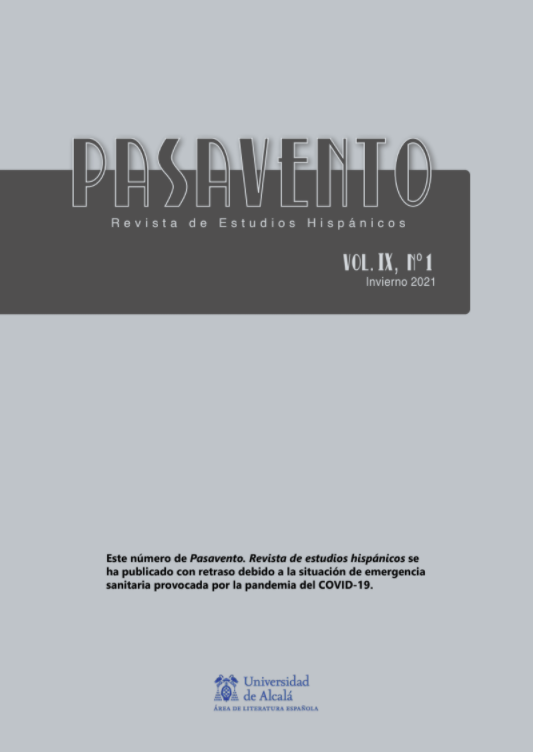The Role of the Author an the Testimonial Condition of the Novels "No, mi general" by Irene Lozano and "Hay algo que no es como me dicen" by Juan José Millás
DOI:
https://doi.org/10.37536/preh.2021.9.1.1086Keywords:
Testimonial Novel, Documentary Value, Subjectivization, Zaida Cantera, Nevenka FernándezAbstract
This study starts from the concept of the testimonial novel and its manifestations in the current Spanish narrative, in order to analyze the documentary elements and the fictional techniques integrated into the works No, mi general by Irene Lozano and Hay algo que no es como me dicen by Juan José Millás. The change in the thematic approach presented by these novels –both tell real stories about mobbing and sexual harassment of women in the Spanish Army and Ponferrada City Council, respectively–, will allow to study their particular structure, as well as the importance of the authors’ role and their real and partial intervention in the case. In this way, the collective and denouncing nature these novels have regarding the aforementioned emerging social problem will be affirmed. Likewise, a special emphasis will be put on subjectivization, an element that proves the testimonial condition of these novels, that is, it affirms the development of a series of techniques that objectify the facts, on the one hand, and certifies the presence of the mechanisms that contribute to the narrativization of the story, on the other. Finally, two levels of narration will be distinguished: the story of the protagonist and the story of the narrator. The first one narrates a real case of harassment from the perspective of the victim, that is, it reinterprets the official truth and reconstructs reality, while the second one acquires a model dimension and appeals to a whole group of harassed women in the workplace.
References
Amar Sánchez, Ana María (1990). “La ficción del testimonio”, Revista Iberoamericana, 151: 447-461.
Amar Sánchez, Ana María (1992). El relato de los hechos. Rodolfo Walsh: testimonio y escritura. Rosario: Beatriz Viterbo Editora.
Augusto Ayuso, C. (2001). “Para un acercamiento a la narrativa de Juan José Millás”, Castilla: Estudios de literatura, 26: 19-34.
Beverley, John (1987). “Anatomía del testimonio”, Revista de Crítica Literaria Latinoamericana, 13.25: 7-16.
Castany Prado, Bernat (2007). Literatura posnacional. Murcia: Universidad de Murcia, Servicio de Publicaciones.
Chillón, Albert (1999). Literatura y periodismo. Una tradición de relaciones promiscuas. Barcelona: Universidad Autónoma de Barcelona.
Duplaá, Christina (1996). La voz testimonial de Montserrat Roig: estudio cultural de los textos. Barcelona: Icaria.
Fauquet, Isabelle (2011). “Trayectorias ejemplares en Hay algo que no es como me dicen. Caso de Nevenka Fernández contra la realidad, de Juan José Millás”, en La ejemplaridad en la narrativa española contemporánea (1950-2010), ed. Amélie Florenchie e Isabelle Touton. Madrid/Frankfurt: Iberoamericana/Vervuert, 259-277.
González Harbour, Berna (2014). “La realidad asalta la ficción”, El País. <http://cultura.elpais.com/cultura/2014/12/03/babelia/1417632850_236816.html> [última visita 12 de marzo de 2020].
Gugelberger, Georg, y Michael Kearney (1991). “Voices of the Voiceless: Testimonial Literature in Latin America”, Latin American Perspectives, 18.3 (parte I): 3-14.
Huertas Uhagón, Begoña (1994). “El postboom y el género testimonio. Miguel Barnet”. Cauce: Revista de filología y su didáctica, 17: 165-176.
Lausberg, Heinrich (1967). Manual de Retórica Literaria. Fundamentos de una ciencia de la literatura, tomo II. Madrid: Gredos.
Lejeune, Philippe (1994). “El pacto autobiográfico (1973)”, in El pacto autobiografico y otros estudios, dir. Francisco Jurdao Arrones, trad. Ana Torrent. Madrid: Megazul-Endymion, 49-88.
Lozano, Irene (2015). No, mi general. Barcelona: Penguin Random House.
Millás, Juan José (2013). Hay algo que no es como me dicen. El caso de Nevenka Fernández contra la realidad [2004]. Barcelona: Seix Barral.
Navajas Navarro, Gonzalo (2002). La narrativa española en la era global. Imagen. Comunicación. Ficción. Barcelona: EUB.
Sánchez Zapatero, Javier (2011). “Escritura autobiográfica y traumas colectivos: de la experiencia personal al compromiso universal”, Revista de Literatura, 73.146: 379-406.
S.f. (2004). “Juan José Millás cree que Nevenka le honró al confiar en él”, El País. <http://elpais.com/diario/2004/03/02/madrid/1078230279_850215.html> [última visita: 25 de marzo de 2020].
Sobejano, Gonzalo (1986). “Testimonio y poema en la novela española contemporánea”,en Actas del VIII Congreso de la Asociación Internacional de Hispanistas, ed. A. David Kossoff et al. Madrid: Istmo, 89-115.
Sobejano, Gonzalo (2007). Lección de novela (España entre 1940 y ayer). Madrid: Mare Nostrum.
Torregrosa Carmona, Juan Francisco, y Carmen Gaona Pisonero (2013). “Antecedentes y perspectivas sobre periodismo literario español durante el siglo xx”, Historia y Comunicación Social, 18 (núm. Especial Octubre): 789-798.
Valls Guzmán, Fernando (2003). La realidad inventada. Análisis crítico de la novela española actual. Barcelona: Crítica.
Downloads
Published
How to Cite
Issue
Section
License
Copyright (c) 2021 Pasavento. Revista de Estudios Hispánicos

This work is licensed under a Creative Commons Attribution 4.0 International License.








